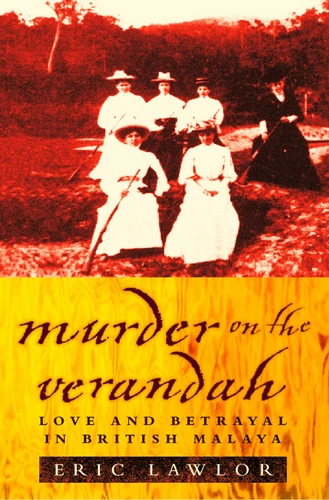Murder on the Verandah. Love and Betrayal in British Malaya (Text Only)
Par :Formats :
Disponible dans votre compte client Decitre ou Furet du Nord dès validation de votre commande. Le format ePub protégé est :
- Compatible avec une lecture sur My Vivlio (smartphone, tablette, ordinateur)
- Compatible avec une lecture sur liseuses Vivlio
- Pour les liseuses autres que Vivlio, vous devez utiliser le logiciel Adobe Digital Edition. Non compatible avec la lecture sur les liseuses Kindle, Remarkable et Sony
- Non compatible avec un achat hors France métropolitaine
 , qui est-ce ?
, qui est-ce ?Notre partenaire de plateforme de lecture numérique où vous retrouverez l'ensemble de vos ebooks gratuitement
Pour en savoir plus sur nos ebooks, consultez notre aide en ligne ici
- Nombre de pages320
- FormatePub
- ISBN978-0-00-752588-1
- EAN9780007525881
- Date de parution27/08/2015
- Protection num.Adobe DRM
- Infos supplémentairesepub
- ÉditeurFlamingo
Résumé
A Malayan White Mischief.
'On Sunday, 23 April 1911, Ethel Proudlock attended Mass at St Mary's Church in Kuala Lumpur. She was well-liked at St Mary's. She helped with jumble sales and had recently joined the choir. After Mass, the vicar's wife invited her to lunch. But Mrs Proudlock declined. She had sewing to do. Then, taking her leave, she drove home and killed her lover.'
In the sensational trial that followed Ethel Proudlock, the Eurasian wife of an Englishman claimed that William Steward, a mine manager, had tried to rape her, but the evidence pointed to a passionate affair, and a murder inspired by jealousy.
Found guilty and sentenced to death, she walked free after being pardoned by the Sultan of Selangor, much against the wishes of British officials. The event scandalized polite society, and revealed the suffocating nature of expatriate life in Malaya, where the British ruled with an unhealthy blend of suburban aspiration and gross insensitivity to the native population. Petty, hypocritical and terribly unhappy, the British never counted Malaya as home and spent their time wishing they weren't there.
'Cheltenham on the Equator' was rocked to its foundations by the dark, sordid nature of the trial. In this compelling work of social history Eric Lawlor examines Ethel Proudlock's case for the first time since the trial, and creates a disturbing portrait of this little-known outpost of Empire. There are qualities of Somerset Maugham (The Letter was based on the Proudlock trial) and Conrad (Heart of Darkness) in Eric Lawlor's book.
Found guilty and sentenced to death, she walked free after being pardoned by the Sultan of Selangor, much against the wishes of British officials. The event scandalized polite society, and revealed the suffocating nature of expatriate life in Malaya, where the British ruled with an unhealthy blend of suburban aspiration and gross insensitivity to the native population. Petty, hypocritical and terribly unhappy, the British never counted Malaya as home and spent their time wishing they weren't there.
'Cheltenham on the Equator' was rocked to its foundations by the dark, sordid nature of the trial. In this compelling work of social history Eric Lawlor examines Ethel Proudlock's case for the first time since the trial, and creates a disturbing portrait of this little-known outpost of Empire. There are qualities of Somerset Maugham (The Letter was based on the Proudlock trial) and Conrad (Heart of Darkness) in Eric Lawlor's book.
A Malayan White Mischief.
'On Sunday, 23 April 1911, Ethel Proudlock attended Mass at St Mary's Church in Kuala Lumpur. She was well-liked at St Mary's. She helped with jumble sales and had recently joined the choir. After Mass, the vicar's wife invited her to lunch. But Mrs Proudlock declined. She had sewing to do. Then, taking her leave, she drove home and killed her lover.'
In the sensational trial that followed Ethel Proudlock, the Eurasian wife of an Englishman claimed that William Steward, a mine manager, had tried to rape her, but the evidence pointed to a passionate affair, and a murder inspired by jealousy.
Found guilty and sentenced to death, she walked free after being pardoned by the Sultan of Selangor, much against the wishes of British officials. The event scandalized polite society, and revealed the suffocating nature of expatriate life in Malaya, where the British ruled with an unhealthy blend of suburban aspiration and gross insensitivity to the native population. Petty, hypocritical and terribly unhappy, the British never counted Malaya as home and spent their time wishing they weren't there.
'Cheltenham on the Equator' was rocked to its foundations by the dark, sordid nature of the trial. In this compelling work of social history Eric Lawlor examines Ethel Proudlock's case for the first time since the trial, and creates a disturbing portrait of this little-known outpost of Empire. There are qualities of Somerset Maugham (The Letter was based on the Proudlock trial) and Conrad (Heart of Darkness) in Eric Lawlor's book.
Found guilty and sentenced to death, she walked free after being pardoned by the Sultan of Selangor, much against the wishes of British officials. The event scandalized polite society, and revealed the suffocating nature of expatriate life in Malaya, where the British ruled with an unhealthy blend of suburban aspiration and gross insensitivity to the native population. Petty, hypocritical and terribly unhappy, the British never counted Malaya as home and spent their time wishing they weren't there.
'Cheltenham on the Equator' was rocked to its foundations by the dark, sordid nature of the trial. In this compelling work of social history Eric Lawlor examines Ethel Proudlock's case for the first time since the trial, and creates a disturbing portrait of this little-known outpost of Empire. There are qualities of Somerset Maugham (The Letter was based on the Proudlock trial) and Conrad (Heart of Darkness) in Eric Lawlor's book.



